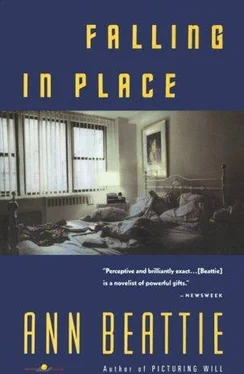Ann Beattie - Falling in Place
Здесь есть возможность читать онлайн «Ann Beattie - Falling in Place» весь текст электронной книги совершенно бесплатно (целиком полную версию без сокращений). В некоторых случаях можно слушать аудио, скачать через торрент в формате fb2 и присутствует краткое содержание. Год выпуска: 1991, Издательство: Vintage, Жанр: Современная проза, на английском языке. Описание произведения, (предисловие) а так же отзывы посетителей доступны на портале библиотеки ЛибКат.
- Название:Falling in Place
- Автор:
- Издательство:Vintage
- Жанр:
- Год:1991
- ISBN:нет данных
- Рейтинг книги:4 / 5. Голосов: 1
-
Избранное:Добавить в избранное
- Отзывы:
-
Ваша оценка:
- 80
- 1
- 2
- 3
- 4
- 5
Falling in Place: краткое содержание, описание и аннотация
Предлагаем к чтению аннотацию, описание, краткое содержание или предисловие (зависит от того, что написал сам автор книги «Falling in Place»). Если вы не нашли необходимую информацию о книге — напишите в комментариях, мы постараемся отыскать её.
Falling in Place — читать онлайн бесплатно полную книгу (весь текст) целиком
Ниже представлен текст книги, разбитый по страницам. Система сохранения места последней прочитанной страницы, позволяет с удобством читать онлайн бесплатно книгу «Falling in Place», без необходимости каждый раз заново искать на чём Вы остановились. Поставьте закладку, и сможете в любой момент перейти на страницу, на которой закончили чтение.
Интервал:
Закладка:

Sitting alone, drinking coffee, looking around the delicatessen and seeing other people, she thought: My God — there are actually other people, like me, sitting here alone. Spangle was so animated that it was like being with several people. That overflow of energy made her nervous. Having people around all the time made her nervous. She thought, sometimes, that if she lived in a tent, people would come and crawl into the tent. Some days she wanted to say to the landlady downstairs: “You’re right — this life I’m leading is crazy. Do something to help me. Get them out of here.” They were men, always. Not women. Not that there were that many men, but John, and Horton, and Jonathan and Spangle, all in such a short time period. It was too much. She had bought the paper and was enjoying sitting alone, no longer feeling guilty for having walked out. She was imitating John’s behavior, and liking it. If they did not mind barging in, she should not mind sneaking out. The other thing to think was that she was already a bad person, damned forever, for causing trouble in John’s marriage. His son had shot his daughter. The little boy she had had lunch with not long ago had pulled the trigger of a gun and his sister was in the hospital, and there were lawyers involved, psychiatrists. That poor fat child had shot his sister. She stirred her coffee and wondered, if she and John had children, whether they would be pretty or whether they would look like John Joel. She had never seen his daughter. She was ten years older than his daughter. He kept saying that, as though she and his daughter had something in common. Her cut finger still hurt, and she hated pain. She could not imagine what it would be like to be shot. She lived in New York City, and she could not imagine any of the possibilities: rape, muggings, murder. That was something she read about in the paper. John Joel’s shooting Mary was something she read about in the paper. She thought that what Horton said about being comfortable in the city made sense. In the city she just did not have time to think all the time and to be frightened: You either adjusted or you went crazy. In the country, every branch rattling against the house became frightening. She had hated the night noises in the country .
She paid her bill at the cash register at the front of the delicatessen. There was an index card Scotch-taped to the side of the register, with a smiling face on it that said: SMILE, I HAVEN’T HAD A VACATION IN FOUR YEARS. The FOUR had been crossed out and 4½ was written above it .
She went back and just what she thought would happen happened: She walked in and Spangle was there. She told him what she thought about that and, exhausted, went into the bedroom .
It could have been anything in the bed — a lump, in the dark. It was what she thought it was, though. It was John. He moved in the bed. He opened his eyes and looked at her as she was undressing .
“I’d ask what you’re doing here, but I have the feeling that I’d sound illogical and you could give a perfectly logical answer,” she said .
“I’m hiding,” he said .
“You’re hiding,” she said. “It must be wonderful.”
“He wants you,” John said. “He told me so tonight. He’s after you, Nina.”
“You make him sound like a bloodhound,” she said. “And me some piece of meat.”
She got into bed. “You’ve got a great deal of nerve, both of you.”
“You’re mad at me?”
“I’m going to sleep,” she said .
“You can’t go to sleep mad.”
He took her hand and squeezed it. He squeezed her cut finger. The stab of pain made her eyes well up with tears. She was going to go to hell for this. He was going to go to hell. They would all meet in hell. It would be small, and swamped with men she knew. All their paths would keep crossing. Spangle was snoring in the other room. She moved against John, to get warm .
Twenty-One

“ITHINK I’ve spent a lot of time talking to most everybody but to you. How do you feel?”
“Like hell,” Mary said.
He nodded. It was going to form a scar — puffy and ugly, the doctor had told him the day before — but there could be a second operation, later, to graft skin over the scar. The doctor thought that a fifteen-year-old girl shouldn’t have such a reminder of what had happened. He told Mary that when the plastic surgery was done, she could wear a two-piece bathing suit and no one would know. They would take skin from another part of her body — the inside of her thigh — and graft it. Mary nodded. She closed her eyes often, even when the doctors were there talking, and imagined other diseases, other things gone wrong, that might have put her in the hospital. It could have been mono. Appendicitis. Something simple. Two psychiatrists came to visit her every day, to tell her that this was not simple. It had been simple, though. She remembered saying goodbye to Angela. She thought Angela was going to trail her home, insisting that she go to another party at Lloyd Bergman’s, but Angela had given up on her. “If you don’t want to, you don’t want to,” Angela had said. Then she had walked through the field, being careful to avoid the poison ivy. Once Angela gave up, the idea of the party seemed more interesting. Walking through the field, she thought about changing her mind. She was still wondering whether she should go to the party or not — the last one hadn’t been as bad as she thought — when she knew that something was wrong. It was just a peculiar feeling she had, that something was going to happen. She looked back, suspecting that Angela was following. She saw a bug alight on her jeans and flicked it off. Before she had turned fully around again, and before she thought to look up in the tree, she felt a terrible explosion in her side, and that was all she remembered. One psychiatrist wanted to know what she had thought when she heard the sound, and she told him there was no sound — just pain that knocked her over, and then she didn’t remember anything. The psychiatrist told her that there was no such thing as a totally silent firing of a gun, even with a silencer. He asked her to try to remember the sound. She smiled at him. She couldn’t. After only three meetings with him, she had figured out that anything she couldn’t remember or didn’t want to talk about could be taken care of with a smile. When she smiled, he smiled. It also worked with the woman. Then, if she didn’t speak, after a while they went on and talked about something else.
She was amazed that John Joel had shot her, of course, but she was also amazed that now she hated him less. In fact, she didn’t hate him at all. She was embarrassed to have been shot. She told the psychiatrist that, and he asked whether she was saying that she somehow deserved to be shot, whether she felt it was something she had asked for. “But this was a real gun. It was shot with the intent to kill you.”
She realized that it was real. That didn’t matter. It mattered that she hurt, but she couldn’t believe that she might have died. Now her father was in the room, and he was smiling at her. She did what the psychiatrist did when she smiled: smiled back and didn’t say anything. Finally he was the one who spoke. He whispered, “Do you hate me?”
Читать дальшеИнтервал:
Закладка:
Похожие книги на «Falling in Place»
Представляем Вашему вниманию похожие книги на «Falling in Place» списком для выбора. Мы отобрали схожую по названию и смыслу литературу в надежде предоставить читателям больше вариантов отыскать новые, интересные, ещё непрочитанные произведения.
Обсуждение, отзывы о книге «Falling in Place» и просто собственные мнения читателей. Оставьте ваши комментарии, напишите, что Вы думаете о произведении, его смысле или главных героях. Укажите что конкретно понравилось, а что нет, и почему Вы так считаете.












